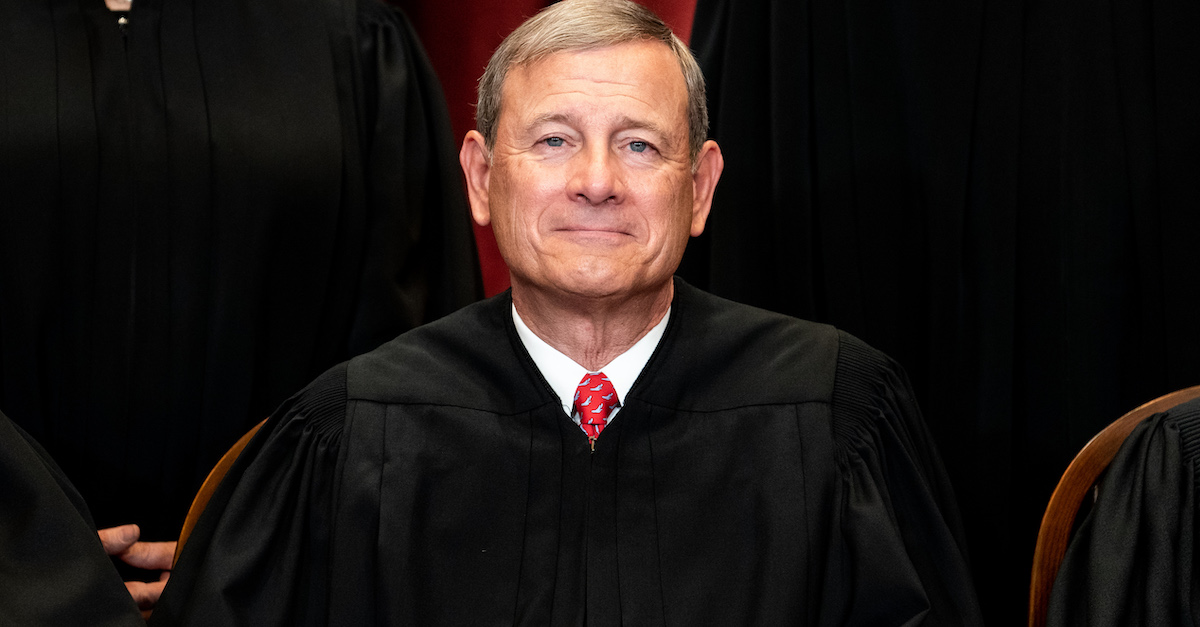
WASHINGTON, DC – APRIL 23: Chief Justice John Roberts sits during a group photo of the Justices at the Supreme Court in Washington, DC on April 23, 2021.
U.S. Attorney General Merrick Garland on Friday announced a lawsuit against the State of Georgia over new voting laws which critics have suggested are aimed at reducing Black turnout. Many attorneys, court watchers, and critics pointed out that literally none of the litigation would be necessary or possible if the U.S. Supreme Court had not struck down several key portions of the Voting Rights Act (VRA) in 2013 — exactly eight years to the day before Garland announced the litigation.
In Shelby County v. Holder, Chief Justice John Roberts wrote for a 5-4 majority that part of a 1965 Civil Rights law which forced onetime Jim Crow jurisdictions to request and receive federal preclearance before changing their voting laws was out of date because “the conditions that originally justified these measures no longer characterize voting in the covered jurisdictions.”
“Nearly 50 years later, things have changed dramatically,” Roberts said of the South generally and of Shelby County, Alabama in particular when looking back at the 1965 laws in that subsequent 2013 case.
The formula used in Section 4(b) of the VRA is considered an integral aspect of the law. Since Shelby County was handed down by the nation’s high court, over two dozen GOP-controlled states have made voting more difficult for poor, working class, and non-white voters.
Late justice Ruth Bader Ginsburg warned of such backsliding on voting rights in an increasingly cited and prescient dissent:
[T]he Court strikes §4(b)’s coverage provision because, in its view, the provision is not based on “current conditions.” It discounts, however, that one such condition was the preclearance remedy in place in the covered jurisdictions, a remedy Congress designed both to catch discrimination before it causes harm, and to guard against return to old ways. Volumes of evidence supported Congress’ determination that the prospect of retrogression was real. Throwing out preclearance when it has worked and is continuing to work to stop discriminatory changes is like throwing away your umbrella in a rainstorm because you are not getting wet.
Earlier this year, Republicans in Georgia passed a suite of such changes which bar the passing out of refreshments to voters waiting in line and severely restrict the use of absentee ballots in the Peach State.
Liberals, Democrats, court watchers, and voting rights advocates, of course, welcomed Garland’s litigation against the Georgia bill — while taking stock of Roberts’ culpability over the whole state of affairs.
“An announcement that comes on the 8th anniversary of Chief Justice Roberts’ decision gutting parts of the VRA in Shelby County,” observed attorney and legal journalist Luppe B. Luppen via Twitter.
Civil Rights attorney Leslie Proll noted:
This report—which is updated regularly—is critical to have at hand. It provides chapter and verse response to Chief Justice Roberts’ pronouncement in Shelby County that “our country has changed.” We are now experiencing most insidious & pervasive voter suppression of modern era. https://t.co/nxW4ID7Jwq
— Leslie Proll (@LeslieProll) June 25, 2021
The pile-on continued apace:
8 years ago today Supreme Court gutted Voting Rights Act
“Things have changed dramatically” wrote John Roberts
But after Shelby County decision 26 STATES have enacted new restrictions on voting
We crunched the numbers https://t.co/uPttnenaeo pic.twitter.com/EztCx9MNcC
— Ari Berman (@AriBerman) June 25, 2021
Eight years ago, the Supreme Court gutted the Voting Rights Act in the Shelby County ruling. John Roberts said voting discrimination was no longer “flagrant, widespread or pervasive.”
Today, 389+ anti-voter bills are being pushed by Republicans.
John Roberts was horribly wrong.
— Sarah Godlewski (@SarahforWI) June 25, 2021
Garland himself subtly took aim at Roberts’ legacy as well.
“If Georgia had still been covered by Section 5, it is likely that SB 202 would never have taken effect,” the attorney general said–alleging that “changes to Georgia’s election laws were enacted with the purpose of denying or abridging the right of Black Georgians to vote on account of their race or color.”
Many others used the opportunity of the announcement to push for new voting rights legislation in Congress.
In 2013, the US Supreme Court gutted a major provision of the Voting Right Act saying: “Nearly 50 years later, things have changed dramatically.”
Today, we are fighting in court around the country because 8 years later, things have changed dramatically for the worse.
— Marc E. Elias (@marceelias) June 25, 2021
Shelby County v. Holder decision 8 years ago changed the landscape of voting rights and protecting the right to vote. It prevented states from enacting restrictive, anti-voter laws. Just this year, 17 states have erected deliberate barriers to voting. We must #RestoreTheVote
— G. K. Butterfield (@GKButterfield) June 25, 2021
[image via Erin Schaff-Pool/Getty Images]